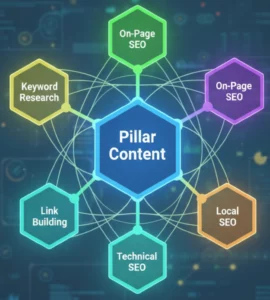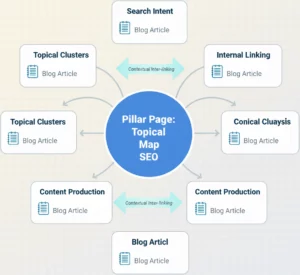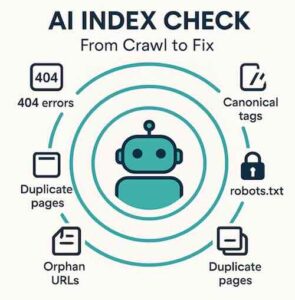
The advent of AI Writers has disrupted the landscape of content creation and SEO. As powerful writing tools, they promise to elevate rankings in search engines and optimize SEO strategies. But what factors influence the variability of their effectiveness, and how can they be mastered to produce impeccable content? Let’s dive into the intricacies of these technological assistants.
Table of Contents
ToggleWhat is an AI Writer?
AI Writers, or artificial intelligence-based writing assistants, are programs designed to produce written content. Using advanced algorithms and natural language processing (NLP) techniques, they transform data and ideas into articles, reports, and other forms of text. They were developed to assist writers in their process and to significantly improve productivity.

The Importance of AI Writers in Modern Content Creation
The content marketing market has greatly benefited from the ability of AI Writers to produce high-quality texts easily and quickly. This allows a website to publish more content, optimized for SEO, while reducing the workload on writing teams. However, the question lies in the disparity of quality that can be observed between the different products of these tools.
Understanding AI Writers
Definition and Key Features
An AI Writer is not just a dictation tool or a basic content generator. It combines keyword research, text analysis, and language generation processes to create article drafts that can rival human writing. They can even adapt their writing to the tone and style desired by the client.
Comparison with Traditional Writing
Unlike a human writer, an AI Writer can compile and synthesize information at lightning speed, creating original content from a well-defined data set. The challenge lies in maintaining quality, which can vary greatly depending on many factors, from the initial input to the algorithm’s power and context sensitivity.

Why Does Content Quality Vary?
Factors Influencing Quality
The variations in the quality of texts produced by an AI Writer often stem from data input, the AI’s technological sophistication, algorithmic updates, and the directives provided during SEO. The tool’s ability to correctly integrate and understand context, nuances, and language subtleties is also a crucial element.
Impact of Information Source and Context
An AI Writer heavily relies on the quality of the source information and contextual guidelines. Poor data or a poorly defined context will tend to produce mediocre results. This shows that behind every competent AI Writer is a solid data foundation and a deep understanding of the subject matter to achieve quality content creation.
Advantages of AI Writers
Time Savings and Increased Productivity
Among the advantages of AI Writers, time savings are perhaps the most obvious. These tools allow writers and SEO specialists to quickly produce drafts that will form the basis of their articles, providing a significant boost to the productivity of their website.
Variety and Diversity in Writing Models
AI Writers can adopt different writing styles to suit various niches and goals. They offer a broad range of possibilities, from technical writing to creative prose, and can even adjust to specific stylistic preferences of a brand or audience.
Assistance in Creating SEO-Friendly Content
Search engine optimization is inherent to AI Writers. By incorporating SEO strategies from the design phase, these assistants significantly improve the SEO and rankings of content, making it more visible on Google and other platforms.
Main Challenges of AI Writers
Handling Nuances and Context
Despite technological advancements, AI Writers still struggle to grasp all the subtleties of human language. Nuances, sarcasm, humor, and broad cultural context may escape their understanding and affect content quality.
Limitations in Understanding Human Emotions
Artificial intelligence, though advanced, cannot match human emotional perception. AI assisted Writers may have difficulty connecting with readers on an emotional level, which is a fundamental aspect in certain content forms like storytelling or advertising.

Challenge of Originality and Plagiarism
Issues of originality and plagiarism are other key concerns. AI Writers draw inspiration from existing content to learn and generate new texts, which can sometimes lead to copyright or authenticity issues.

How to Maximize the Quality of Generated Content?
Precise Preparation and Configuration
Thorough preparation and clear parameter definition are essential to guide the AI Writer towards producing high-quality content. This includes feeding relevant data, precise keyword selection, and setting appropriate creative guidelines.
Post-Generation Evaluation and Adjustment
After generation, a critical evaluation of the content is essential. It is necessary to adjust the portions that do not meet expectations and refine the article to reflect the required quality standards.
Integration of Human Proofreading
Despite their effectiveness, AI Writers cannot fully replace the finesse of human judgment. Careful proofreading and touch-ups by a real person are often the last step needed to ensure the quality and relevance of the published content.

Usage Examples and Case Studies
To illustrate the potential of AI Writers, nothing beats concrete cases. Employed for blog content creation, analytical report production, or even in the advertising sector, their flexibility allows them to adapt to many editorial needs.
Criteria for Selecting an AI Writer
Language Skills and Linguistic Variety
The quality of content generated by an AI Redactor largely depends on its language skills and its ability to handle language with the same dexterity as a human. Linguistic variety and adjustment ability are therefore essential criteria.

SEO Integration and Optimization Features
SEO proficiency is another determining factor. A good AI Redactor should integrate features that support search engine optimization, to improve page rankings.

Customization and Adaptation to Target Audience
Customization to meet target audience expectations is crucial. An AI Writer should therefore be able to adapt not only to the desired tone but also to the specificity of the intended readership.
AI Writers’ Outlook
Technological evolution promises to strengthen AI Writers’ capabilities. Machine learning and the expansion of their application areas herald a future where they will be ubiquitous. However, this also raises ethical and regulatory questions that will need to be addressed.

Ultimately, AI Assisted Writers have revolutionized the world of content creation and SEO. Despite quality variations, it is undeniable that this technology makes a significant contribution. Its proper
use can elevate content to higher levels, paving the way for a new era of AI-assisted writing.

Eric Ibanez
Co-fondateur de Hack The SEO
Eric Ibanez a créé Hack The SEO et accompagne des stratégies SEO orientées croissance. Il est aussi co-auteur du livre SEO pour booster sa croissance, publié chez Dunod.
Suggested Articles




